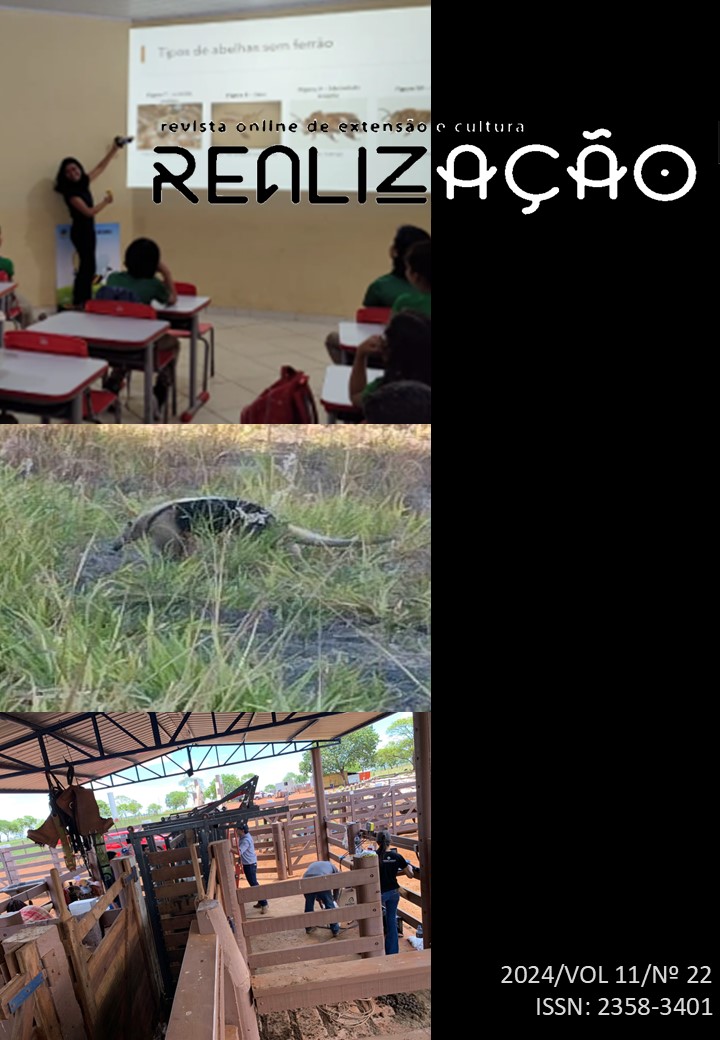Contribuição das abelhas e meliponicultura para o município de Santarém – PA
DOI:
https://doi.org/10.30612/realizacao.v11i22.18949Palavras-chave:
Abelhas sem ferrão, Amazônia, Educação, SantarémResumo
Este trabalho objetivou contribuir para o desenvolvimento da meliponicultura na região de Santarém – PA, por meio da troca de conhecimentos com meliponicultores locais, do ensino de técnicas de manejo adequado e da sensibilização da população sobre a importância das abelhas sem ferrão no ambiente urbano, e da necessidade de sua conservação. O projeto iniciou com a aplicação de dois questionários via Google Formulários, sendo o primeiro questionário direcionado à população geral de Santarém, com o intuito de avaliar o nível de conhecimento sobre a presença e importância das abelhas na cidade, e o segundo questionário teve como foco identificar e mapear os meliponicultores locais, bem como compreender suas necessidades e desafios. A partir da consulta à comunidade, foram realizadas visitas a propriedades dedicadas à criação de abelhas sem ferrão, essenciais para a troca de experiências e para a avaliação do conhecimento técnico dos meliponicultores. Também foram produzidos materiais informativos sobre a importância das abelhas e a valorização de seus produtos, assim como publicidades para popularização do tema. O projeto facilitou a troca de conhecimentos com meliponicultores locais, incluindo a implantação de um meliponário em uma comunidade local e a sensibilização de crianças sobre a importância das abelhas sem ferrão. A divulgação do projeto nas redes sociais ampliou sua visibilidade e despertou o interesse do público. Assim, o projeto de meliponicultura urbana em Santarém demonstrou-se promissor, promovendo o envolvimento da comunidade local, a troca de saberes e a conscientização sobre a relevância das abelhas nativas para a sustentabilidade ambiental e a segurança alimentar.
Downloads
Referências
CONTRERA, F.A.L.; MENEZES C.; VENTURIERI, G.C. New horizons on stingless beekeeping (Apidae, Meliponini). Revista Brasileira de Zootecnia, Viçosa, v. 40, p. 48–51, 2011.
MAIA, U. M. et al. Perfil da meliponicultura potiguar. Rio Grande do Norte. Nov. 2017.
VENTURIERI, G. Meliponicultura: Criação de Abelhas Indígenas Sem Ferrão. Embrapa. Belém–PA, 2004. Dez. p01 QUEIROZ, A. C. et al. Ações de educação ambiental em meliponicultura. - Portal Embrapa. [s. l.], 2017.
Downloads
Publicado
Como Citar
Edição
Seção
Licença
Copyright (c) 2024 Leticia Sarmento, Luís Davi Silva de Oliveira, Maria Glenda da Silva Gonzaga, Paula Manuele dos Santos Viana, Graciene Conceição dos Santos, Fabrizia Sayuri Otani

Este trabalho está licenciado sob uma licença Creative Commons Attribution-NonCommercial-ShareAlike 4.0 International License.
Autores que publicam nesta revista aceitam as normas de publicação, bem como, concordam com os seguintes termos:
(a) O Conselho Editorial se reserva ao direito de efetuar, nos originais, alterações da Língua portuguesa para se manter o padrão culto da língua, respeitando, porém, o estilo dos autores.
(b) Autores mantêm os direitos autorais e concedem à revista o direito de primeira publicação, com o trabalho simultaneamente licenciado sob a Creative Commons Atribuição-NãoComercial-CompartilhaIgual 4.0 Internacional que permite: Compartilhar — copiar e redistribuir o material em qualquer suporte ou formato e Adaptar — remixar, transformar, e criar a partir do material. A Creative Commons Atribuição-NãoComercial-CompartilhaIgual 4.0 Internacional considera os termos seguintes:
- Atribuição — Você deve dar o crédito apropriado, prover um link para a licença e indicar se mudanças foram feitas. Você deve fazê-lo em qualquer circunstância razoável, mas de nenhuma maneira que sugira que o licenciante apoia você ou o seu uso.
- NãoComercial — Você não pode usar o material para fins comerciais.
- CompartilhaIgual — Se você remixar, transformar, ou criar a partir do material, tem de distribuir as suas contribuições sob a mesma licença que o original.
- Sem restrições adicionais — Você não pode aplicar termos jurídicos ou medidas de caráter tecnológico que restrinjam legalmente outros de fazerem algo que a licença permita.


